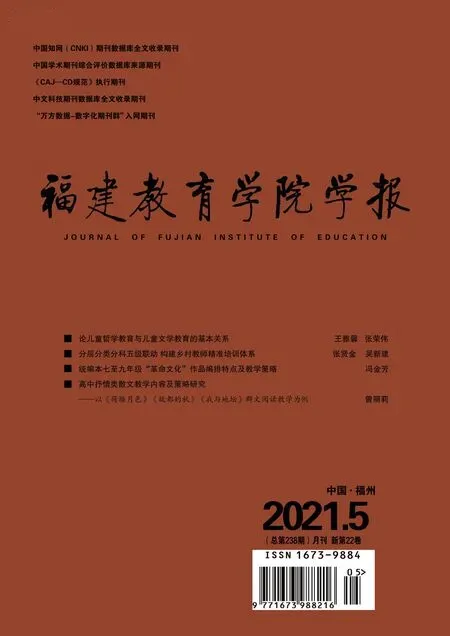指向学生思维品质发展的初中英语听说课教学探究
——以仁爱版8B U4 T1 Section A 为例
陈琼香
(长泰区教师进修学校,福建 漳州 363900)
《普通高中英语课程标准(2017 年版)》将思维品质列为英语学科核心素养之一,明确了英语教学的育人价值。“思维品质是思维活动中一个人身上表现出的智力和能力,它体现了每个人的思维水平和智力、能力的区别”。[1]英语语言输入的基础是听,教学中为学生提供有效的足够的语言输入,有利于提升学生的听力水平和口语能力;英语语言输出的关键是说,为了提高习得者的语言习得能力,要进行语言的有效输出。初中是个体思维开始走向成熟的阶段,在听说教学环节中,“发展学生思维品质,首先需要教师设计出能发展思维品质的活动”[2]。但大多数的听说课,都是根据课文设置的问题开展听力训练和机械性的口语操练,学生处于低阶层思维品质的语言输出,思维品质得不到培养。文章以仁爱版《Project English》8B Unit4 Topic1 What’s the strongest animal on the farm? Section A(1a-1c)的教学内容为例,探讨如何在听说课教学中培养学生的思维品质。
一、Pre-listening:创设情境,唤醒思维
在实际教学中,有些听说课“忽视对主题语境的创设和对主题意义的深层探究,导致思维培养的缺失”。[3]在听前教学中,课前导入应设计与学生生活环境息息相关的情境,唤醒学生已有的知识。本节课围绕“the differences between the countryside and the city”展开听前教学。第一步,展示学生所居住的乡村周边的动物图片,复习已有的单词duck、chicken、goose、pig、cat、dog 等,从而引出新单词hen、horse、cow、sheep。接着,展示教师的家乡枋洋的美景图片,结合上一单元所学的句型Do you love your hometown?和新词组询问学生:Do you often enjoy the beautiful nature there?引导发散思维,让学生欣赏自己身边的美景并基于已有的认知经验,联想引出新单词:nature、beauty、clear river、blue sky。最后,展示教师家乡美景和附近学生较熟悉的厦门城市景图,根据以下 问 题Q1:Is the countryside quiet?Q2:Is the city noisy? Q3:Which is quieter the city or the countryside?Q4:Where can you enjoy the beauty of the nature? Let students discuss the differences between the city and the countryside,鼓励学生大胆讨论两个地方的区别并试着作比较,自然过渡到后续教授新句型:the air is fresher,the sky is bluer and the rivers are clearer in the countryside.由旧引新,逐步唤醒学生的思维。
二、while-listening:设置问题,发展思维
有效的问题设置,为学生提供充足而有效的语言输入,培养学生的创造性思维,直接影响学生思维品质的发展和学习成效,为后续的听力活动和语言输出奠定基础。在听中教学中,通过层层设置以下问题,引导学生从低阶思维向高阶思维发展。
1.听第一遍后,回答以下问题:
Does Kang Kang like the countryside?
2.听第二遍后,完成以下单选题:
(1)What are Kang and Michael are talking about?
A.the city B.the countryside C.the life in the countryside
(2)Where does Wang Wei often go for his summer holiday?
A.in the countryside B.in the city C.We don’t know
3.听第三遍后,完成下列表格:

指向学生思维品质发展的听的教学,将听力任务融于其中,问题逐步开展,层层深入,从简单的Yes或No 到单选,再到第三遍的填词,给予学生有效的语言“input”,以发展学生的思维。
三、Post-listening:口语活动,强化思维
“学习和使用语言要借助思维,同时,学习和使用语言又能进一步促进思维的发展。”[4]基于思维品质的听说教学,不但要有听前、听中活动,还要引领学生对所听材料进行跟读模仿,并深入分析、理解、记忆、intake、transfer 和巩固语言点,最终实现语言的有效“input”。目的是使学生的语音、语调更地道,也为后续语言“output”做好铺垫。通过将所学的听力材料的相关内容进一步延伸,指导学生以原有的认知为基础,积极进行新的认知建构,最终实现语言的有效输出。以下是听后活动设计:
Activity 1
Student A:Which do you like better,the city or the countryside?
Student B:I like…better.I think …in the city is/are…than that/those in the countryside.
Student C:I think the…is much…than the…
Student D:I like…because …in the countryside is/are…than that/those in the city.
Activity 2
Four students a group.Discuss about which place to travel,the city or the countryside.
Activity 3
Then,one student acts as interviewer.The other three students act as three travelers to use Comparative Degrees of Adjectives(比较级)sentences to express their ideas.
上述口语活动设计包含感知、归纳再到最后的运用。首先,引导学生找出本课的重点表达城市和农村比较的句子,整体感知所学的知识;其次,围绕口语训练,让学生回顾、归纳、总结本课表示比较的句型;最后,结合上一单元,表达对城市或农村的喜爱以及理由,通过发散性思维和逻辑思维,表述自己的观点看法。
四、分层作业,提升思维
课堂教学的补充和延续体现在课外作业上。听说教学要想达到较理想的效果,必须在课外作业上下苦功。针对具体学情:所教学生优等生占比20%、中等生占25%、潜能生占相当大比率达到55%,在作业布置上进行分层设计。常规作业布置模式是全班统一一种作业,即“一刀切”,分层设计作业可以使不同层次的学生都能感受学习的乐趣和成就感。所设计的作业基于学生认知水平,分为三个层次:第一个层次到第三个层次的难度系数逐层提高,目的是满足不同层次学生的需求。内容包括巩固课内知识到最后如何成为一个环保志愿者,使学生的思维品质得到升华。分层作业设计如下:
Level A:(1)Practice the useful phrases and main sentences in 1a.(2)Follow and imitate the conversation of 1a.
Level B:(1)Recite the conversation of 1a..(2)Design a dialogue according to 1a about like and dislike of the countryside and the city.
Level C:(1)Recite the conversation of 1a.(2)Why more and more people like the countryside? When the city becomes dirtier and dirtier What can we do? To make our city better,every one of us should be a greener person to protect our city.Write a passage about“How to be a greener person”.

